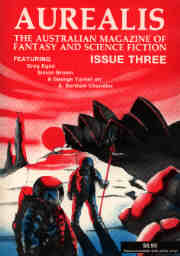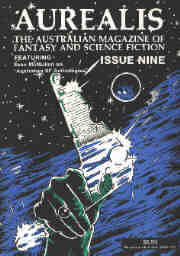Aurealis #149
$3.99
- From the Cloud — Stephen Higgins
- What Fresh Hell? — Michael Pryor
- Advena — Tom Walters
- God’s Doodle Pad — Christopher Witty
From the Cloud
Stephen Higgins
I have heard that there are two sub genres which seem to divide readers of speculative fiction. I mean, there are tons of other things as well but if I try to list everything that divides Spec Fic fans we could be here for ages. Anyway, Space Opera, and Sword and Sorcery. Fans of Science fiction seem to have a weird relationship with Space Opera. They either love it or cannot abide it. There doesn’t seem to be an in-between. The same applies to Sword and Sorcery. Fantasy fans seem to either read nothing but Sword and Sorcery, or don’t read any at all.
When I first heard this, I tended to agree. But then I thought about my own tastes in these areas. I like some Space Opera. I guess I like some Sword and Sorcery as well, but I haven’t read an awful lot of it. I have read a lot of awful Sword and Sorcery but of course, that’s not quite the same thing. But it does highlight the point I wanted to make.
I think genre readers tend to celebrate the good Space Opera, and the good Sword and Sorcery, and they just keep quiet about the rest. I mean, I don’t go around discussing all of the bad books I have read. I will mention them to friends when we are recommending books to each other (or books to avoid to each other) but I tend to be pretty perfunctory in my remarks. I read quite a few books each year and invariably there will be some duds in there. They are not memorable. So, I don’t remember them. I think the problem isn’t that some people only like Space Opera and therefore only talk about Space Opera, but instead it is that they only like good Space Opera and talk at length about it. Similarly, lovers of Sword and Sorcery, love good Sword and Sorcery and disregard the rest. It then seems as if there are only the two options to choose from: love Space Opera or hate it. Or love Sword and Sorcery or hate it.
I suppose that if you have not been exposed to good Sword and Sorcery, you will not have a passion for it and you might say that you hate that stuff. But, in reality, you only hate the small sample of that stuff that you have read. Now that everyone is a critic, people seem to be more vehement in their reviews of fiction. Like most people, I tend to avoid the one-star reviews of books, music and films as well as the gushing five-star recommendations. The balanced three-star reviews usually have some good observations to make. They allow that there are some problems, and they explain what those problems might be. They also recognise the positives in the text and explain why they view these attributes as positives. One- and five-star reviews are not necessarily reviews so much as confirmation bias.
Anyway… This is the April edition of Aurealis. Full of great fiction, fantastic art and impartial reviews. It is just fantastic in every way imaginable. Truly great and life affirming work is contained herein. Or life changing work! It is that good. This isn’t a review by the way, this is an advertisement.
From What Fresh Hell? by Michael Pryor:
Demon abductions have gone through the roof, so to speak, and they’ve reached the point that governments everywhere can’t ignore the fact that truckloads of their citizens are being hauled off to Hell before they have actually, you know, died.
The response? Since no earthly power can do anything to stop massive, almost invulnerable supernatural beings crashing into residences and grabbing people, governments basically shrugged their shoulders. They all lined up and declared that the only thing to do was to learn to live with wholesale demon abductions.
Governments, eh? Who would have thought that a system thought up by imperfect mortals to elect other imperfect mortals to take care of things would end up imperfect?
From Advena by Tom Walters:
The men were tasked by Virgil to reap the barley fields; the harvest had yielded well this season. Leonard worked in silence hoping the rhythm of the scythe would keep his mind off the dream and let reality settle around him, but the memory of it lingered; thousands of yellow eyes staring at him from within a yawning black hole, whispering ‘welcome’. The dream was utterly terrifying.
Leonard felt the eyes of Virgil’s Protectors on him as he laboured in the field. Surely they could not tell he had dreamed. Eight of them patrolled the golden rows of barley dressed neck to toe in black cassocks, uncomfortable in this spring heat, Leonard guessed. No man had spoken ill, or complained, or idled in their chores for months, yet The Protectors made for threatening companions as they worked. Cecilia’s friend Elizabeth was the last to suffer their heavy-handed rule. Poor girl.
The sun rose high and then sank low turning the fields to dusky purple. The sweat of the men cooled and dried on their necks and shirts, all the while Leonard’s mind would not quiet; maybe the dream would not return, maybe he could ask for a higher dose of Somnizosin? No, once his mind was infected it was too late. But how? How could he be dreaming? He and Cecilia were diligent members of The Community, they took their course of Somnizosin each day obediently, and never once in six years had they left the village.
From God’s Doodle Pad by Christopher Witty:
I say, ‘So, you want to hear a story?’
Freddy laughs again. I wish he’d stop doing that. ‘Sure, Pop,’ he says. ‘Haw haw.’
‘One time, this guy comes to see me, and, like you, he thinks he’s crazy. Tells me a story about a coat. An everyday, light brown trench coat, like you see a million times in the city. Now, this guy, he tells me he’s murdered a girl, a pretty blonde, twenty years old. He thinks he’s gotten away with it, and the guilt’s killing him. But he can’t confess. Do you know why?’
‘’Cos he’ll swing for it.’
‘That, sure. But also because his story’s so outlandish that nobody would ever believe him. And, in many ways, he’s innocent of the crime.’
‘But you said he told you he murdered the girl.’
‘He did. But he also told me that the guy who owned the coat before him went to the chair for murdering a girl the summer before.’





